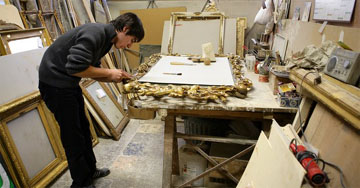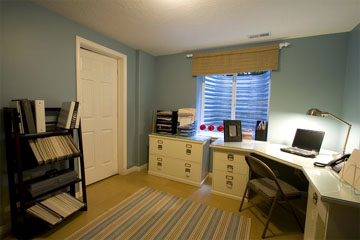 Hi folks, the majority of households in Ireland today may include a student, artist, business enthusiast, teacher- all sorts of individuals who have different needs and interests. However, space often becomes a challenge for these individuals when faced with pursuing their lifestyle in such a restricted setting. Today, we assess some ways to organise working areas in your home to allow the best use of space and room.
Hi folks, the majority of households in Ireland today may include a student, artist, business enthusiast, teacher- all sorts of individuals who have different needs and interests. However, space often becomes a challenge for these individuals when faced with pursuing their lifestyle in such a restricted setting. Today, we assess some ways to organise working areas in your home to allow the best use of space and room.
The amount of space required for an activity varies based on the activity, as some activities may be able to share space with another. A spare bedroom, for example, can be used during the day as an artist’s studio but in the evening can be used to write and do homework as most of the artist’s accessories can be easily removed.
 However, many other hobbies may require their own personal space such as repair work, where a permanent bench and enough wall space for keeping tools is the minimum that is required. In such circumstances, where mess is inevitable and no one room can be solely devoted to the activity, the conversion of a conservatory or loft should be put into consideration.
However, many other hobbies may require their own personal space such as repair work, where a permanent bench and enough wall space for keeping tools is the minimum that is required. In such circumstances, where mess is inevitable and no one room can be solely devoted to the activity, the conversion of a conservatory or loft should be put into consideration.
Another alternative to this would be to have a small extension built onto the house or a shed put up in the garden. A shed can be used for the whole year, regardless of the weather, with adequate insulation and a small bottled-gas/paraffin heater.
 After deciding on your work area, any possible additions to the workspace that would help accommodate the demands of the activity should be considered. Among these items to be considered should be worktops, cupboards and shelves, which are, in most cases, the most common items in a work area. Ensure that there are enough power points available if a worktop consisting of electrical appliances, a drill or a saw for example, is required for the activity.
After deciding on your work area, any possible additions to the workspace that would help accommodate the demands of the activity should be considered. Among these items to be considered should be worktops, cupboards and shelves, which are, in most cases, the most common items in a work area. Ensure that there are enough power points available if a worktop consisting of electrical appliances, a drill or a saw for example, is required for the activity.
 If the activity can cause excessive noise, sound-proofing may be required to prevent the disturbance of family members or neighbours. Partition walls between rooms and party walls should be the primary walls to be attended to if considering sound-proofing.
If the activity can cause excessive noise, sound-proofing may be required to prevent the disturbance of family members or neighbours. Partition walls between rooms and party walls should be the primary walls to be attended to if considering sound-proofing.
Lighting must be good enough to support most activities, such as painting or sewing. If possible, as much daylight as possible would be ideal and will be most effective if the window faces north. For artificial lighting consider using LED lighting which saves energy costs and last longer than traditional fluorescent or halogen bulbs. If toxic products or materials are present in the room, such as glues, resins or acids, adequate ventilation is essential. Windows and air-bricks should not be relied on and an extractor fan should be present that is big enough for the size of the room.
I hope you found this article helpful. If you have any comments or suggestions on this subject please feel free to enter them in the comments box below, we’d be delighted to hear your experiences in organising more space for working areas in your home.
Cheers,
Oliver Dempsey
Tradesmen.ie
10th February 2014
Some other articles that you might be interested in are listed below:
Tips for removing Common Stains in the Home
15 Tips for Reducing your Heating Bill
House Extensions – 12 Tips on Extending Your Home
Security Camera Tips for Your Home
Burglar Alarms – Tips to Protect Your Home






